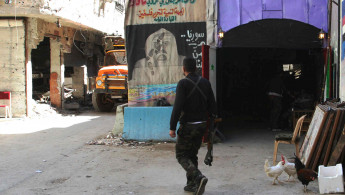Syrian regime and Palestinian allies look to oust IS from capital 'within days'
Syrian troops and allied Palestinian fighters are massing around the last Islamic State bastion in the capital, preparing for an all-out offensive if talks on an evacuation deal fall through.
The extremists seized most of the Yarmouk refugee camp in 2015 after months of heavy fighting. The built-up residential area on the southern edge of Damascus was once home to some 200,000 Palestinians, mainly refugees from the 1948 war with Israel and their descendants — as well as tens of thousands of middle-class Syrians.
Today there are some 2,500 IS fighters in Yarmouk and nearby neighbourhoods, according to Khaled Abdul-Majid, a leader of the government-allied Palestinian Resistance Factions Coalition. He said the battle would begin within days if the militants do not agree to be evacuated.
Yarmouk is one of the last pockets held by IS, after the extremists were driven from nearly all the territory they once controlled in Syria and Iraq. It is also the last part of the capital outside government control, after rebels evacuated the eastern Ghouta suburbs following a fierce government offensive and an alleged poison gas attack.
The government has proposed a similar evacuation deal for IS. But instead of sending the militants to the northern rebel-held province of Idlib, it would dispatch them to a pocket of territory near Israel and Jordan controlled by an IS affiliate, according to the Britain-based Syrian Observatory for Human Rights. The Observatory, which closely monitors the war through sources inside Syria, said IS has demanded to go to Idlib instead.
Abdul-Majid said the most extreme of the IS fighters reject any settlement, but he insisted they have no choice but to leave to southern Syria or face a government offensive. Insurgents from other groups in nearby neighbourhoods, however, would be allowed to go to Idlib or take part in a government amnesty.
 |
Despite all the preparations and reinforcement we hope that there will be a deal and not a battle. We don't want further destruction in the camp after all the battles over the years |  |
There are about 5,000 civilians in Yarmouk, Abdul-Majid said. Some 40,000 Syrians and 4,500 Palestinians displaced from Yarmouk are living in the adjacent neighbourhoods of Babila, Yalda and Beit Sahem, which are controlled by other insurgent groups. Tadamon, which is partly controlled by IS, is home to 3,000 civilians, and there are 20,000 residents in IS-held Hajar Aswad, the vast majority of them family members of IS fighters, he said.
"Despite all the preparations and reinforcement we hope that there will be a deal and not a battle," he said. "We don't want further destruction in the camp after all the battles over the years."
Twitter Post
|
Any military operation would be led by Syrian troops, pro-regime Palestinian factions and the Assad-aligned paramilitary National Defence Forces.
"I don't think that the battle will be difficult and long," Abdul-Majid said, estimating that the fighting would only take a few days.
Syrian President Bashar al-Assad's forces have retaken a number of cities and towns from IS as well as Syrian rebel groups since Russia entered the war in 2015, providing crucial air support.
Since being taken over by IS, Yarmouk has been a target of multiple regime bombing and shelling campaigns. According to the UN, nearly four thousand Palestinian refugees have been killed in Syria's war. Most have been internally displaced inside Syria, with thousands having fled the country.
The eastern Ghouta suburbs, which had been in rebels hands since 2012, fell to government forces in recent weeks. The rebels surrendered Douma, the last town they held in eastern Ghouta, after an alleged gas attack on April 7 that prompted US, British and French airstrikes a week later.
Damascus residents have celebrated the government's victory in eastern Ghouta, from which the insurgents used to lob mortar rounds and rockets into the capital.
"As we liberated Ghouta, we want to liberate the (Yarmouk) camp, Hajar Aswad, and to get rid of the terrorists," said Bilal Ataya, 60. He owns a shop selling shoes and bags in the Qasaa neighborhood, which had come under frequent rebel shelling from eastern Ghouta. "We suffered a lot here from Ghouta. Thank God Ghouta is over and we hope the camp will be over soon."





 Follow the Middle East's top stories in English at The New Arab on Google News
Follow the Middle East's top stories in English at The New Arab on Google News
![Netanyahu furiously denounced the ICC [Getty]](/sites/default/files/styles/image_330x185/public/2024-11/GettyImages-2169352575.jpg?h=199d8c1f&itok=-vRiruf5)
![Both Hamas and the Palestinian Authority welcomed the ICC arrest warrants [Getty]](/sites/default/files/styles/image_330x185/public/2024-11/GettyImages-2178351173.jpg?h=199d8c1f&itok=TV858iVg)
